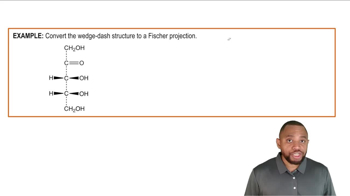d-Fructose can also form a six-membered ring. Draw the anomer of d-fructose in the six-membered ring form.
Ch.6 Carbohydrates–Life’s Sweet Molecules
Chapter 3, Problem 13a
Draw the Fischer projection for the enantiomer (mirror image) of each of the following:
(a) <IMAGE>
d-Altrose
 Verified step by step guidance
Verified step by step guidance1
Identify the chiral centers in the d-Altrose structure. Altrose is an aldohexose, so it has four chiral centers.
Draw the Fischer projection for d-Altrose. In a Fischer projection, the carbon chain is drawn vertically with the most oxidized carbon at the top. For d-Altrose, the hydroxyl groups (OH) are arranged as follows: right, left, left, right (RLLR) from top to bottom.
To find the enantiomer, you need to create the mirror image of the d-Altrose Fischer projection. This involves switching the positions of all the hydroxyl groups (OH) across the vertical axis.
For the enantiomer of d-Altrose, the hydroxyl groups will be arranged as left, right, right, left (LRRL) from top to bottom.
Draw the Fischer projection for the enantiomer of d-Altrose using the new arrangement of hydroxyl groups. Ensure that the vertical carbon chain remains unchanged, and only the positions of the OH groups are mirrored.

Verified Solution
Video duration:
1mWas this helpful?
Key Concepts
Here are the essential concepts you must grasp in order to answer the question correctly.
Fischer Projection
The Fischer projection is a two-dimensional representation of a three-dimensional organic molecule, particularly useful for depicting the stereochemistry of carbohydrates and amino acids. In this format, the vertical lines represent bonds that are oriented away from the viewer, while horizontal lines represent bonds that are coming towards the viewer. This method simplifies the visualization of stereoisomers, including enantiomers, which are non-superimposable mirror images.
Recommended video:
Guided course

Fischer Projections Example 1
Enantiomers
Enantiomers are a type of stereoisomer that are mirror images of each other and cannot be superimposed. They typically arise in molecules that contain one or more chiral centers, where the arrangement of atoms around the chiral center leads to two distinct configurations. Enantiomers often exhibit different optical activities, meaning they rotate plane-polarized light in opposite directions, which is a key characteristic used to distinguish them.
Recommended video:
Guided course

Enantiomers vs Diastereomers Concept 1
D- and L- Configuration
The D- and L- notation is a system used to classify the stereochemistry of sugars and amino acids based on the orientation of the hydroxyl group (-OH) on the chiral carbon farthest from the carbonyl group. In D-configuration, the hydroxyl group is on the right in the Fischer projection, while in L-configuration, it is on the left. This classification is crucial for understanding the biological roles and interactions of these molecules, particularly in biochemistry.
Recommended video:
Guided course

D vs L Enantiomers Concept 1
Related Practice
Textbook Question
7
views
Textbook Question
Classify each of the following monosaccharides by the type of carbonyl group and the number of carbons (for example, a monosaccharide with an aldehyde and three carbons is an aldotriose).
(a) <IMAGE>
17
views
Textbook Question
Classify each of the following monosaccharides by the type of carbonyl group and the number of carbons (for example, a monosaccharide with an aldehyde and three carbons is an aldotriose).
(a) <IMAGE>
9
views
Textbook Question
Classify structures A, B, and C in the figure as being either an enantiomer or a diastereomer of d-galactose.
<IMAGE>
17
views
Textbook Question
Use the structure of d-galactose in Problem 6.15 to answer the following:
(a) Draw the Fischer projection of the carbon 3 epimer.
17
views
Textbook Question
Identify the monosaccharide that fits each of the following descriptions:
(a) also referred to as dextrose
18
views
